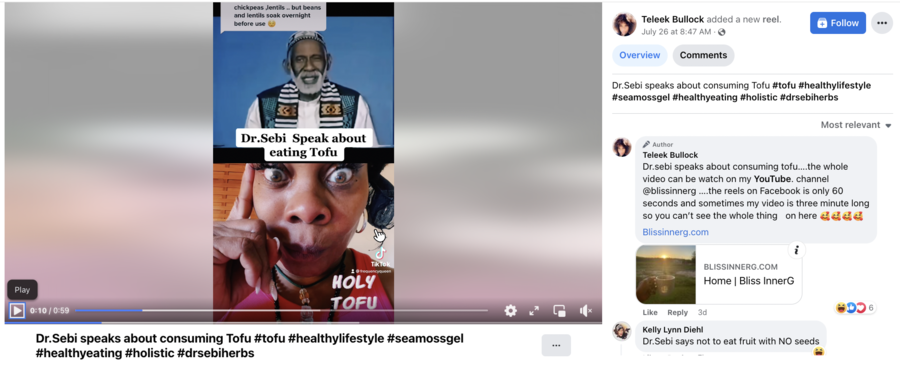
Do soybeans or soy-based products such as tofu contain plastic? No, that's not true: This claim is based on another false statement -- that starch, present in this plant in insignificant amounts -- is an unnatural product. The source of this claim is self-proclaimed "Doctor" Sebi, who did not have a medical degree and was sued for customer fraud in New York.
The claim appeared in a video posted to Facebook on July 26, 2022, under the title "Dr.Sebi speaks about consuming Tofu." It begins:
Because many people think that tofu is a natural food ... Well, did you know that tofu was made in England? The bean is called soy. That bean was made by a Benedictine priest. His name was Gregor Mendel. ...
That bean contains starch, an inorganic [inaudible]. When you eat tofu, you're eating plastics.
Here is what the Facebook post looked like at the time of writing:
(Source: Facebook screenshot taken on Fri Jul 29 19:32:23 PM 2022 UTC)
This video contains several false statements.
Soybeans were not made in England by Gregor Mendel. A 19th-century Austrian scientist who is now regarded as a founder of genetics, he is known for experiments with peas, not soybeans.
Soybeans came into existence centuries before. According to the book "Soybeans: Chemistry, Technology, and Utilization" by Keshun Liu, this plant originated in China 4,000 to 5,000 years ago and "was considered one of five sacred grains, along with rice, wheat, barley, and millet." In contrast, the first man-made plastic was invented only in 1862.
The fact that soybeans contain less than 1 percent starch does not make them plastic because starch is not an artificial substance and can be easily found in nature, such as in many fruits and vegetables, as Lead Stories recently wrote.
Even the fact that bioplastics can be produced from soybean products such as soybean oil does not support the claim that this plant is plastic by itself. First and foremost, bioplastic is different from regular plastic: The former is made of plants and, thus, is biodegradable, while the latter is produced from petroleum-based products so its decomposition process may take up to 500 years. But in both cases, the final material is produced as a result of chemical reactions that change the original properties of the substance, turning it into something else that it initially was not.
The unsupported claim that the soybean is unnatural is not new. Similar posts appeared on Facebook in 2018 and 2020. Both cited the same man, Dr. Sebi. He was an immigrant from Honduras who died in 2016, best known for promoting questionable herb-based products. He was not a medical doctor and once was successfully sued by New York for customer fraud.
Other Lead Stories fact checks related to claims made by Dr. Sebi can be found here.


















